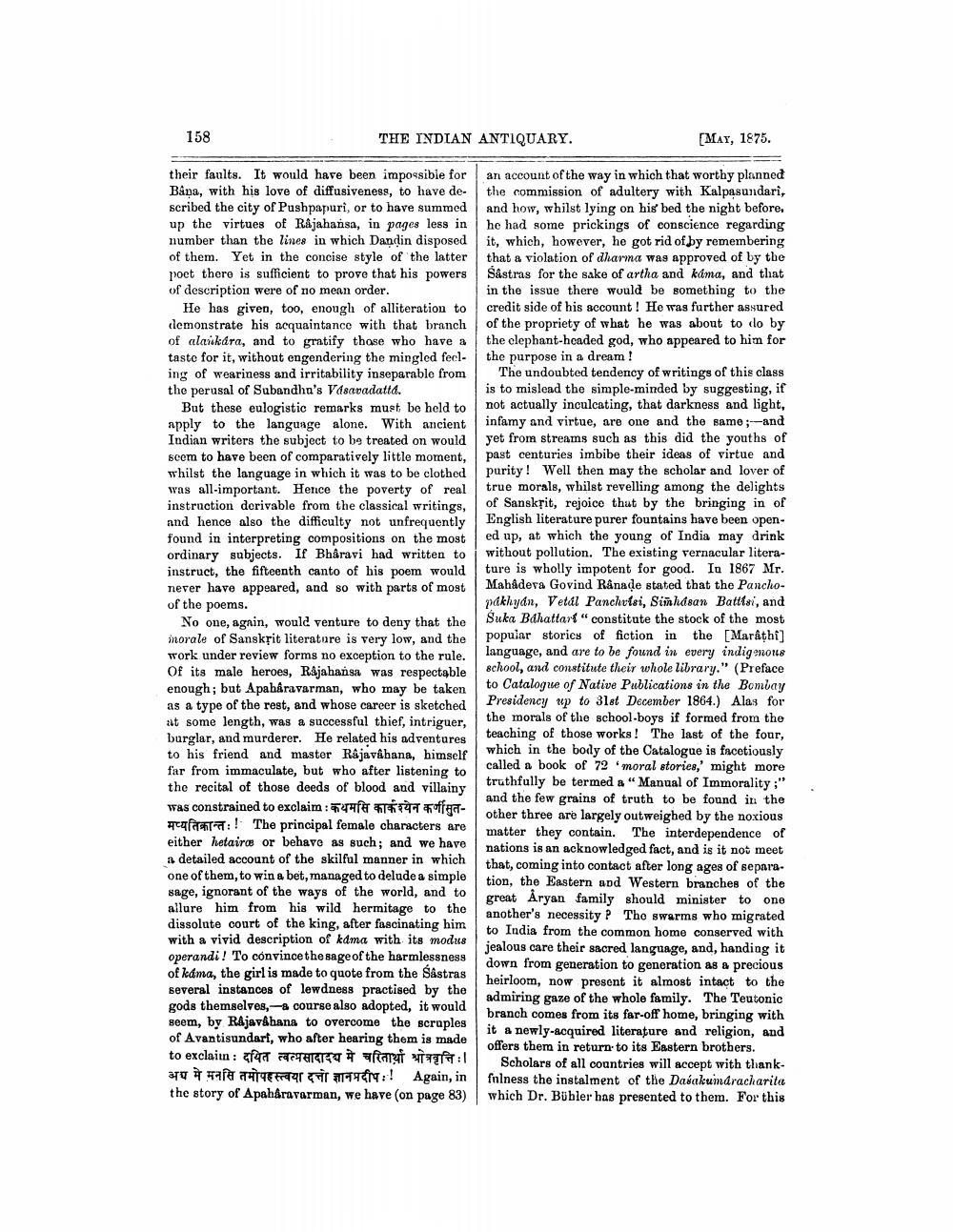________________
158
THE INDIAN ANTIQUARY.
their faults. It would have been impossible for Bâna, with his love of diffusiveness, to have described the city of Pushpapuri, or to have summed up the virtues of Rajahansa, in pages less in number than the lines in which Dandin disposed of them. Yet in the concise style of the latter poet there is sufficient to prove that his powers of description were of no mean order.
He has given, too, enough of alliteration to demonstrate his acquaintance with that branch of alankára, and to gratify those who have a taste for it, without engendering the mingled feeling of weariness and irritability inseparable from the perusal of Subandhu's Vasavadattá.
But these eulogistic remarks must be held to apply to the language alone. With ancient Indian writers the subject to be treated on would seem to have been of comparatively little moment, whilst the language in which it was to be clothed was all-important. Hence the poverty of real instruction derivable from the classical writings, and hence also the difficulty not unfrequently found in interpreting compositions on the most ordinary subjects. If Bhåravi had written to instruct, the fifteenth canto of his poem would never have appeared, and so with parts of most of the poems.
[MAT, 1875.
an account of the way in which that worthy planned the commission of adultery with Kalpasundari, and how, whilst lying on his bed the night before, he had some prickings of conscience regarding it, which, however, he got rid of by remembering that a violation of dharma was approved of by the Sâstras for the sake of artha and káma, and that in the issue there would be something to the credit side of his account! He was further assured of the propriety of what he was about to do by the clephant-headed god, who appeared to him for the purpose in a dream!
The undoubted tendency of writings of this class is to mislead the simple-minded by suggesting, if not actually inculcating, that darkness and light, infamy and virtue, are one and the same;--and yet from streams such as this did the youths of past centuries imbibe their ideas of virtue and purity! Well then may the scholar and lover of true morals, whilst revelling among the delights of Sanskrit, rejoice that by the bringing in of English literature purer fountains have been opened up, at which the young of India may drink without pollution. The existing vernacular literature is wholly impotent for good. In 1867 Mr. Mahadeva Govind Rânade stated that the Panchopákhyán, Vetál Panchetei, Simhasan Battisi, and Suka Báhattart" constitute the stock of the most popular stories of fiction in the [Marathi] language, and are to be found in every indigenous school, and constitute their whole library." (Preface to Catalogue of Native Publications in the Bombay Presidency up to 31st December 1864.) Alas for the morals of the school-boys if formed from the teaching of those works! The last of the four, which in the body of the Catalogue is facetiously called a book of 72 moral stories,' might more
No one, again, would venture to deny that the inorale of Sanskrit literature is very low, and the work under review forms no exception to the rule. Of its male heroes, Rajahansa was respectable enough; but Apahâravarman, who may be taken as a type of the rest, and whose career is sketched at some length, was a successful thief, intriguer, burglar, and murderer. He related his adventures to his friend and master Rajavahana, himself far from immaculate, but who after listening to the recital of those deeds of blood and villainy was constrained to exclaim कथमसि कार्कश्येन कर्णीसुतमप्यतिक्रान्तः! The principal female characters are either hetaire or behave as such; and we have a detailed account of the skilful manner in which one of them, to win a bet, managed to delude a simple sage, ignorant of the ways of the world, and to allure him from his wild hermitage to the dissolute court of the king, after fascinating him with a vivid description of kama with its modus operandi! To convince the sage of the harmlessness
truthfully be termed a "Manual of Immorality;" and the few grains of truth to be found in the other three are largely outweighed by the noxious matter they contain. The interdependence of nations is an acknowledged fact, and is it not meet that, coming into contact after long ages of separation, the Eastern and Western branches of the
great Aryan family should minister to one another's necessity? The swarms who migrated to India from the common home conserved with jealous care their sacred language, and, handing it down from generation to generation as a precious
of káma, the girl is made to quote from the Sâstras heirloom, now present it almost intact to the several instances of lewdness practised by the gods themselves,-a course also adopted, it would seem, by Rajavahana to overcome the scruples of Avantisundarf, who after hearing them is made to exclain: दयित त्वत्प्रसादादद्य मे चरितार्था श्रोत्रवृत्ति: । अथ मे मनसि तमोपहस्त्वया दत्तो ज्ञानप्रदीप: ! Again, in the story of Apahâravarman, we have (on page 83)
admiring gaze of the whole family. The Teutonic it a newly-acquired literature and religion, and branch comes from its far-off home, bringing with
offers them in return to its Eastern brothers.
Scholars of all countries will accept with thankfulness the instalment of the Dasakumáracharita which Dr. Bühler has presented to them. For this




